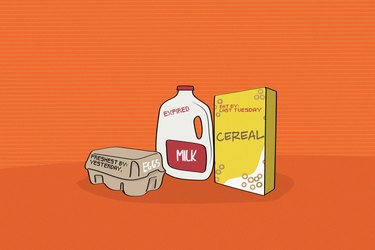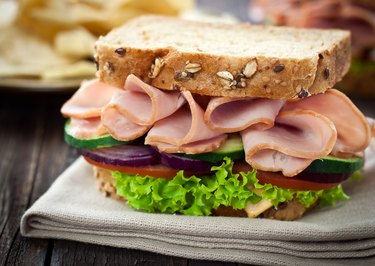
We've all checked the date listed on a food item to determine if it was still "good," whether while deep-cleaning the refrigerator or rummaging through the pantry for a snack. And if that date was in the past, well, you probably tossed the item into the garbage.
But what would have happened if you ignored the date and ate it anyway? Is it really that bad to eat expired food?
Video of the Day
Video of the Day
About Those Food Expiration Dates
Those "sell by," "use by" and "best if used by" dates listed on the foods in your fridge and on your pantry shelves might seem ironclad, but you shouldn't give them too much weight.
"People put a lot of stock into the date on the product and sometimes throw things away without even tasting it based on the date, which doesn't correspond to any scientifically informed food safety guidance," Elizabeth Balkan, director of food waste at the Natural Resources Defense Council (NRDC), tells LIVESTRONG.com.
According to the U.S. Department of Agriculture (USDA), those dates primarily refer to food quality rather than food safety. And they're not set by the government, either. Rather, it's the manufacturers themselves who set the dates based on when they think the product will be at its peak — a practice that's been around since the 1970s, per the NRDC.
There's only one food category that the government regulates: infant formula. And that's because the nutrients start to decline after a certain amount of time on the shelf, not because the formula is spoiled or likely to cause illness, according to the NRDC.

So, What Are the Risks of Eating Expired Food?
Still, most people toss expired food rather than consuming it to avoid getting sick. And while food poisoning is a common occurrence (affecting one in six Americans each year, according to the USDA), it's not likely to happen as a result of eating expired food.
"You're not going to get sick by tasting it, and you're probably not going to get sick by consuming it," Balkan says.
Most cases of food poisoning occur after eating something that's contaminated with harmful bacteria, such as salmonella or listeria. These bacteria don't magically appear once that expiration date passes, though — they're likely present at the time you purchase the item, according to the U.S. National Library of Medicine.
"By and large what we find is that if a food has gone bad, you will be able to smell or taste that it's rotten and that it could be harmful to you. It's not going to taste good, so you're going to stop eating it."
Listeria, for instance, initiates on the farm, Balkan says. "You've purchased lettuce with listeria," she explains. "It's not developing listeria from being in your fridge too long."
Food poisoning can also be the result of eating a food that's been mishandled, such as if someone with contaminated hands touches the food before it lands on your plate or if an egg salad sandwich is left out in the hot sun all day, according to the U.S. National Library of Medicine.
Despite what most Americans think, it's the amount of time a food spends in the temperature danger zone of 40 to 120 degrees Fahrenheit that's the main indicator of a food's safety, not the amount of time the product's been stored, according to the NRDC.
Balkan adds that botulism — a type of food poisoning caused by bacteria from improperly sterilized canned foods — also poses a risk, though she says it's extremely rare and is more of a threat if the canned item comes from someone's DIY efforts.
That's not to say you should eat expired food on the regular, though. Even if it doesn't make you sick, it may not taste as good as it would have if you'd eaten it closer to the purchase date.
Consider a weird smell, texture or color a sign that it's best to toss the food rather than eat it, according to the USDA.
"By and large what we find is that if a food has gone bad, you will be able to smell or taste that it's rotten and that it could be harmful to you," Balkan says. "It's not going to taste good, so you're going to stop eating it."
Foods That Might Be OK After the "Best by" Date
1. Pasteurized milk, cheese and yogurt: In general, these foods won't go bad since harmful bacteria are killed during the pasteurization process, according to the U.S. Food & Drug Administration. Will it smell bad and seem unappetizing? Maybe — but it won't necessarily make you sick.
2. Non-perishable foods: These are also generally OK to consume past the date listed on the package so long as they've been handled properly, according to the University of Wyoming.
"With the caveat that you should always use your senses and let your tastebuds guide your decision-making, I would say that for anything that's shelf-stable — things that are processed and have preservatives in them, like cereal and bread — almost certainly the date on the package means very little in terms of food safety," Balkan says. "It might mean nothing."

Foods Not to Eat After the Expiration Date
Still, it's a good idea to abide by the expiration dates of some foods.
Balkan recommends using more caution for things that are perishable, and Dana Gunders, the interim executive director of ReFED, a nonprofit committed to reducing U.S. food waste, suggests heeding the expiration dates of foods that doctors tell pregnant women to avoid, including:
- Deli meat
- Ready-to-eat foods that aren't heated (like pre-made sandwiches)
- Raw eggs
- Unpasteurized dairy products
Related Reading
Tips on Food Safety
There's one big catch to all of this: In order for the food to be OK to eat past its expiration date, it must have been handled and stored properly.
Here are five tips to abide by to ensure food safety:
1. Store food safely. Keep raw meat, poultry and fish separate from other foods in order to prevent cross-contamination, advises the Mayo Clinic.
2. Handle it properly. Clean hands and surfaces can reduce your risk of developing a foodborne illness.
3. Cook the item to safe temperatures. According to the Mayo Clinic, harmful bacteria is killed when a food is cooked thoroughly. FoodSafety.gov outlines that poultry should be cooked to an internal temperature of 165 degrees, beef and pork to 145 degrees and egg dishes to 160 degrees.
4. Maximize the shelf life of the product. Store pantry items between 50 and 70 degrees, ideally in metal, glass or plastic containers. Keep perishable refrigerator products, such as meat and eggs, in the coldest section of the fridge to maximize freshness.
5. Track how long the item's been stored. FoodSafety.org has a handy chart outlining how long each type of food can be stored in a refrigerator or freezer. Most items last up to five days in the refrigerator (at 40 degrees or below) and 1 month to a year in the freezer (0 degrees or below).
So, How Bad Is It Really to Eat Expired Food?
Not nearly as bad as you might think.
Generally, eating a food past its expiration date doesn't pose a major risk to you because dates on food items indicate food quality rather than food safety.
Of course, that doesn't mean you want to make a habit out of eating expired foods (especially not deli meat and unpasteurized dairy products), but consider it no big deal if you dig into crackers or hummus with a date on the label that's in the past, especially if you've followed the food safety tips above.
- USDA: “Before You Toss Food, Wait. Check It Out!”
- Natural Resources Defense Council: “The Dating Game: How Confusing Labels Land Billions of Pounds of Food in the Trash”
- USDA: “Food Product Dating”
- USDA: “Check Your Steps: Food Safe Families”
- U.S. National Library of Medicine: “Food Poisoning”
- U.S. Food & Drug Administration: “The Dangers of Raw Milk: Unpasteurized Milk Can Pose a Serious Health Risk”
- University of Wyoming Extension: “How Long Can You Safely Store Food?”
- American Pregnancy Association: “Foods to Avoid During Pregnancy”
- Mayo Clinic: “Food Poisoning”
- FoodSafety.gov: “Safe Minimum Cooking Temperatures Charts”
- FoodSafety.gov: “Cold Food Storage Chart”
